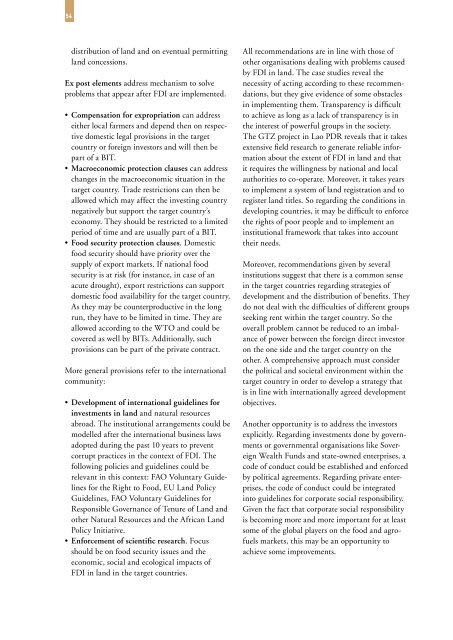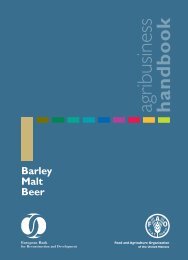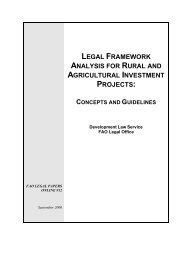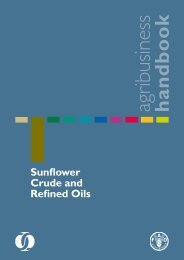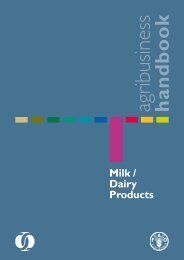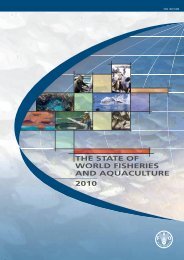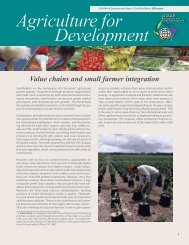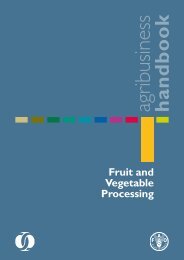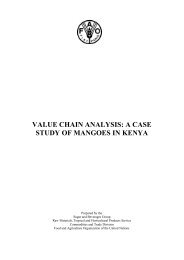Foreign Direct Investment (FDI) in Land in developing countries
Foreign Direct Investment (FDI) in Land in developing countries
Foreign Direct Investment (FDI) in Land in developing countries
- No tags were found...
You also want an ePaper? Increase the reach of your titles
YUMPU automatically turns print PDFs into web optimized ePapers that Google loves.
54distribution of land and on eventual permitt<strong>in</strong>gland concessions.Ex post elements address mechanism to solveproblems that appear after <strong>FDI</strong> are implemented.• Compensation for expropriation can addresseither local farmers and depend then on respectivedomestic legal provisions <strong>in</strong> the targetcountry or foreign <strong>in</strong>vestors and will then bepart of a BIT.• Macroeconomic protection clauses can addresschanges <strong>in</strong> the macroeconomic situation <strong>in</strong> thetarget country. Trade restrictions can then beallowed which may affect the <strong>in</strong>vest<strong>in</strong>g countrynegatively but support the target country’seconomy. They should be restricted to a limitedperiod of time and are usually part of a BIT.• Food security protection clauses. Domesticfood security should have priority over thesupply of export markets. If national foodsecurity is at risk (for <strong>in</strong>stance, <strong>in</strong> case of anacute drought), export restrictions can supportdomestic food availability for the target country.As they may be counterproductive <strong>in</strong> the longrun, they have to be limited <strong>in</strong> time. They areallowed accord<strong>in</strong>g to the WTO and could becovered as well by BITs. Additionally, suchprovisions can be part of the private contract.More general provisions refer to the <strong>in</strong>ternationalcommunity:• Development of <strong>in</strong>ternational guidel<strong>in</strong>es for<strong>in</strong>vestments <strong>in</strong> land and natural resourcesabroad. The <strong>in</strong>stitutional arrangements could bemodelled after the <strong>in</strong>ternational bus<strong>in</strong>ess lawsadopted dur<strong>in</strong>g the past 10 years to preventcorrupt practices <strong>in</strong> the context of <strong>FDI</strong>. Thefollow<strong>in</strong>g policies and guidel<strong>in</strong>es could berelevant <strong>in</strong> this context: FAO Voluntary Guidel<strong>in</strong>esfor the Right to Food, EU <strong>Land</strong> PolicyGuidel<strong>in</strong>es, FAO Voluntary Guidel<strong>in</strong>es forResponsible Governance of Tenure of <strong>Land</strong> andother Natural Resources and the African <strong>Land</strong>Policy Initiative.• Enforcement of scientific research. Focusshould be on food security issues and theeconomic, social and ecological impacts of<strong>FDI</strong> <strong>in</strong> land <strong>in</strong> the target <strong>countries</strong>.All recommendations are <strong>in</strong> l<strong>in</strong>e with those ofother organisations deal<strong>in</strong>g with problems causedby <strong>FDI</strong> <strong>in</strong> land. The case studies reveal thenecessity of act<strong>in</strong>g accord<strong>in</strong>g to these recommendations,but they give evidence of some obstacles<strong>in</strong> implement<strong>in</strong>g them. Transparency is difficultto achieve as long as a lack of transparency is <strong>in</strong>the <strong>in</strong>terest of powerful groups <strong>in</strong> the society.The GTZ project <strong>in</strong> Lao PDR reveals that it takesextensive field research to generate reliable <strong>in</strong>formationabout the extent of <strong>FDI</strong> <strong>in</strong> land and thatit requires the will<strong>in</strong>gness by national and localauthorities to co-operate. Moreover, it takes yearsto implement a system of land registration and toregister land titles. So regard<strong>in</strong>g the conditions <strong>in</strong>develop<strong>in</strong>g <strong>countries</strong>, it may be difficult to enforcethe rights of poor people and to implement an<strong>in</strong>stitutional framework that takes <strong>in</strong>to accounttheir needs.Moreover, recommendations given by several<strong>in</strong>stitutions suggest that there is a common sense<strong>in</strong> the target <strong>countries</strong> regard<strong>in</strong>g strategies ofdevelopment and the distribution of benefits. Theydo not deal with the difficulties of different groupsseek<strong>in</strong>g rent with<strong>in</strong> the target country. So theoverall problem cannot be reduced to an imbalanceof power between the foreign direct <strong>in</strong>vestoron the one side and the target country on theother. A comprehensive approach must considerthe political and societal environment with<strong>in</strong> thetarget country <strong>in</strong> order to develop a strategy thatis <strong>in</strong> l<strong>in</strong>e with <strong>in</strong>ternationally agreed developmentobjectives.Another opportunity is to address the <strong>in</strong>vestorsexplicitly. Regard<strong>in</strong>g <strong>in</strong>vestments done by governmentsor governmental organisations like SovereignWealth Funds and state-owned enterprises, acode of conduct could be established and enforcedby political agreements. Regard<strong>in</strong>g private enterprises,the code of conduct could be <strong>in</strong>tegrated<strong>in</strong>to guidel<strong>in</strong>es for corporate social responsibility.Given the fact that corporate social responsibilityis becom<strong>in</strong>g more and more important for at leastsome of the global players on the food and agrofuelsmarkets, this may be an opportunity toachieve some improvements.


